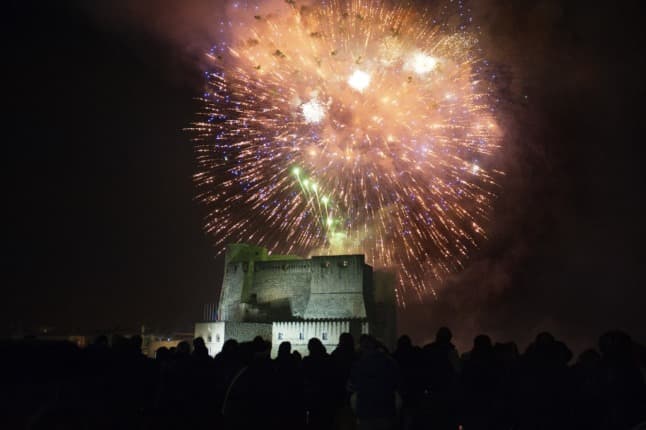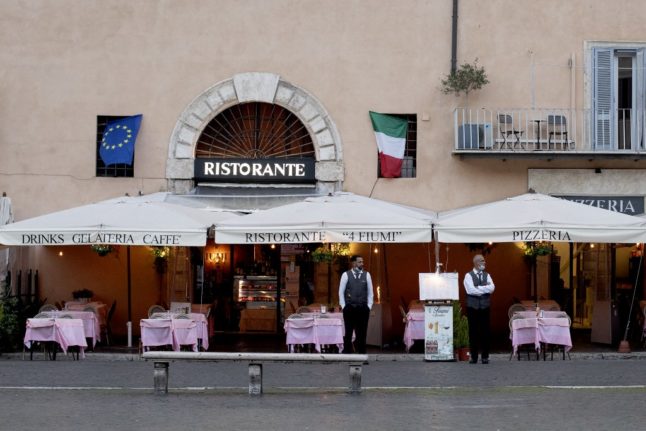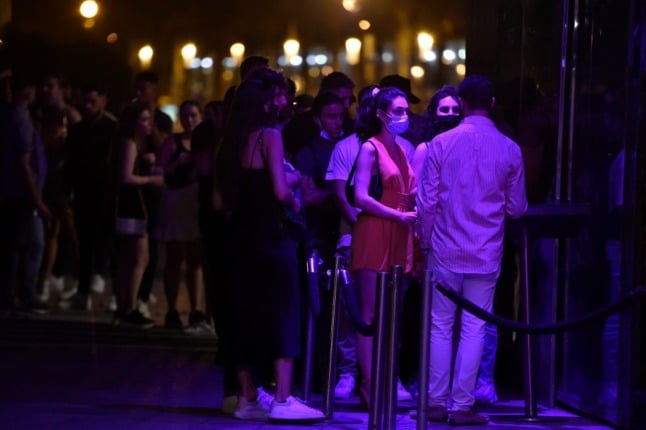EXPLAINED: What are Italy's Covid restrictions this New Year's Eve?

As another year of the pandemic draws to a close, Italy once again has Covid restrictions in place for New Year's Eve. Here's an overview of how you can - and can't - celebrate.
While Italy's New Year's Eve restrictions will be less severe than in 2020, when the whole country was placed under high-risk 'red' zone restrictions, the current soaring Covid infections have prompted the authorities to introduce tighter measures to halt the spread.
Italy’s government last week unanimously approved stricter rules on public gatherings, among measures included in a new decree which came into effect as of December 25th.
Outdoor public events and parties have been temporarily banned during the festive season, from December 25th-December 31st, after many local authorities had already chosen to cancel Christmas and New Year’s Eve events in towns and cities across the country.
EXPLAINED: What changes under Italy’s new Covid decree?
So what does this mean for your New Year's Eve festivities? Here's a closer look at the rules on what you can and can't do to welcome Capodanno 2022.
Parties and gatherings
No outdoor public events or gatherings in Italy's squares are permitted for this year's New Year celebrations, with a temporary ban in place from December 25th-December 31st. Nightclubs and dance venues are closed until January 31st.
However, there's no ban on celebrating New Year's Eve at home with friends and relatives.
There aren't any limitations on the number of guests either, unlike last year when only two people were allowed in someone else's home - and it wasn't possible to see in the new year together either, due to the 10pm curfew (which hasn't made a comeback, either.)
However, Italian authorities and health experts continue to urge people to be cautious amid concern about infections spreading at private gatherings.
"The only doubt I continue to have is that this closure of discos and dance halls will generate uncontrollable private parties, as was the case this summer," said the president of the Emilia-Romagna Region, Stefano Bonaccini, as the new rules came into force on Saturday.
Calendar: When do Italy’s Covid-19 rules change?
Health Minister Roberto Speranza said that over the holidays "it is important that individual behaviour is appropriate: maximum attention, prudence, masks, hygiene and distancing."
Experts continue to warn against kissing and hugging relatives, and against the large family gatherings typical in Italy before the pandemic.
The scientific advice remains to celebrate only with close family members, and preferably only those who are vaccinated, along with the basic precautions of distancing and frequent hand sanitation.
“The holidays can be spent with loved ones this year, but everything must be done in the name of common sense," virologist Fabrizio Pregliasco of the University of Milan told newspaper Corriere della Sera.
He asked people to consider whether they "really need" to hold a New Year's Eve party and said that, if the answer is yes, they should limit invitees to close family members and people they see regularly.
He advised: "Eight guests, ten at the most. At the table, a minimum distance of 70 centimeters must be maintained. One metre is better."
"Getting together only with vaccinated people reduces the risk of infection, although it does not eliminate it. Get vaccinated and you can enjoy the holidays. Tests cannot be considered a substitute,” said Pregliasco.

Photo by Tiziana FABI / AFP
Restaurants
There's no need to cancel your New Year's Eve dinner reservations, as eating out in restaurants can go ahead.
However, you'll only be able to sit at the table if you have a 'reinforced' or 'super' green pass, issued to those vaccinated against Covid or those who have recovered from infection. It can't be obtained following a negative test result.
This measure follows the latest directives contained in the new decree. Effective as of December 25th, the government has extended the ‘super’ green pass requirement to bars and restaurants – including for bar service.
Travel
There are no restrictions on travel this year and it's permitted to move from one municipality to another or from one region to another without the need for documentation.
This is true for both the 'white' zone and the 'yellow' zone, but the situation would change if a region entered an 'orange' zone - something that no regions are currently at risk of.
This is a big change from last year's national 'red' zone over the festive period, when the only movements allowed were for reasons of work, health or strict necessity.
If you're travelling by public transport, the new changes dictate that you must wear FFP2 grade face masks, regardless of the mode of transport.
Good news for those with trips booked abroad as the same applies to travel outside of Italy - it remains allowed. There are different restrictions in place depending on the destination, so it's always advisable to check the latest rules before you travel.

Photo by Pau BARRENA / AFP
READ ALSO:
- Should I travel within Italy or abroad this festive season?
- MAP: The Italian regions becoming ‘yellow’ zones in December
- Travel: Italy introduces random Covid testing for all arrivals
Masks
Masks must now be worn at all times in both indoor and outdoor public places after Italy reintroduced the rule from Saturday, including in the lowest risk 'white' zones. The measure is in force until at least January 31st.
The new requirement to wear FFP2 masks is not limited to those travelling on public transport. Because of the higher protection they provide against the transmission of infection, FFP2 masks are mandatory for access to any performance (such as a cinema showing or sports event) open to the public, whether indoors or outdoors.
Regional variations
While these are the measures nationally, local authorities in each region and city can choose to apply even tighter restrictions of their own.
In the city of Bari, for example, it's forbidden to play music, both live and recorded, outside a property in order to avoid public gatherings.
Meanwhile in Naples, bars and other catering establishments are prohibited from selling alcoholic and non-alcoholic beverages, excluding water, on a takeaway basis from 11am until 5am.
Following Bologna's decision to cancel New Year's Eve celebrations in its main square, Piazza Maggiore, access has now been totally forbidden to anyone without a proven need from 9pm on December 31st until 7am on January 1st.
Other cities have cancelled events or banned dancing after dinner, for instance. It's recommended to check your local restrictions before making any New Year's Eve plans.
See the latest news and updates from The Local on Italy’s current Covid-19 health measures and travel restrictions.
For further details about Italy’s current Covid-19 health measures please see the Italian Health Ministry’s website (available in English).
Comments
See Also
While Italy's New Year's Eve restrictions will be less severe than in 2020, when the whole country was placed under high-risk 'red' zone restrictions, the current soaring Covid infections have prompted the authorities to introduce tighter measures to halt the spread.
Italy’s government last week unanimously approved stricter rules on public gatherings, among measures included in a new decree which came into effect as of December 25th.
Outdoor public events and parties have been temporarily banned during the festive season, from December 25th-December 31st, after many local authorities had already chosen to cancel Christmas and New Year’s Eve events in towns and cities across the country.
EXPLAINED: What changes under Italy’s new Covid decree?
So what does this mean for your New Year's Eve festivities? Here's a closer look at the rules on what you can and can't do to welcome Capodanno 2022.
Parties and gatherings
No outdoor public events or gatherings in Italy's squares are permitted for this year's New Year celebrations, with a temporary ban in place from December 25th-December 31st. Nightclubs and dance venues are closed until January 31st.
However, there's no ban on celebrating New Year's Eve at home with friends and relatives.
There aren't any limitations on the number of guests either, unlike last year when only two people were allowed in someone else's home - and it wasn't possible to see in the new year together either, due to the 10pm curfew (which hasn't made a comeback, either.)
However, Italian authorities and health experts continue to urge people to be cautious amid concern about infections spreading at private gatherings.
"The only doubt I continue to have is that this closure of discos and dance halls will generate uncontrollable private parties, as was the case this summer," said the president of the Emilia-Romagna Region, Stefano Bonaccini, as the new rules came into force on Saturday.
Calendar: When do Italy’s Covid-19 rules change?
Health Minister Roberto Speranza said that over the holidays "it is important that individual behaviour is appropriate: maximum attention, prudence, masks, hygiene and distancing."
Experts continue to warn against kissing and hugging relatives, and against the large family gatherings typical in Italy before the pandemic.
The scientific advice remains to celebrate only with close family members, and preferably only those who are vaccinated, along with the basic precautions of distancing and frequent hand sanitation.
“The holidays can be spent with loved ones this year, but everything must be done in the name of common sense," virologist Fabrizio Pregliasco of the University of Milan told newspaper Corriere della Sera.
He asked people to consider whether they "really need" to hold a New Year's Eve party and said that, if the answer is yes, they should limit invitees to close family members and people they see regularly.
He advised: "Eight guests, ten at the most. At the table, a minimum distance of 70 centimeters must be maintained. One metre is better."
"Getting together only with vaccinated people reduces the risk of infection, although it does not eliminate it. Get vaccinated and you can enjoy the holidays. Tests cannot be considered a substitute,” said Pregliasco.

Restaurants
There's no need to cancel your New Year's Eve dinner reservations, as eating out in restaurants can go ahead.
However, you'll only be able to sit at the table if you have a 'reinforced' or 'super' green pass, issued to those vaccinated against Covid or those who have recovered from infection. It can't be obtained following a negative test result.
This measure follows the latest directives contained in the new decree. Effective as of December 25th, the government has extended the ‘super’ green pass requirement to bars and restaurants – including for bar service.
Travel
There are no restrictions on travel this year and it's permitted to move from one municipality to another or from one region to another without the need for documentation.
This is true for both the 'white' zone and the 'yellow' zone, but the situation would change if a region entered an 'orange' zone - something that no regions are currently at risk of.
This is a big change from last year's national 'red' zone over the festive period, when the only movements allowed were for reasons of work, health or strict necessity.
If you're travelling by public transport, the new changes dictate that you must wear FFP2 grade face masks, regardless of the mode of transport.
Good news for those with trips booked abroad as the same applies to travel outside of Italy - it remains allowed. There are different restrictions in place depending on the destination, so it's always advisable to check the latest rules before you travel.

READ ALSO:
- Should I travel within Italy or abroad this festive season?
- MAP: The Italian regions becoming ‘yellow’ zones in December
- Travel: Italy introduces random Covid testing for all arrivals
Masks
Masks must now be worn at all times in both indoor and outdoor public places after Italy reintroduced the rule from Saturday, including in the lowest risk 'white' zones. The measure is in force until at least January 31st.
The new requirement to wear FFP2 masks is not limited to those travelling on public transport. Because of the higher protection they provide against the transmission of infection, FFP2 masks are mandatory for access to any performance (such as a cinema showing or sports event) open to the public, whether indoors or outdoors.
Regional variations
While these are the measures nationally, local authorities in each region and city can choose to apply even tighter restrictions of their own.
In the city of Bari, for example, it's forbidden to play music, both live and recorded, outside a property in order to avoid public gatherings.
Meanwhile in Naples, bars and other catering establishments are prohibited from selling alcoholic and non-alcoholic beverages, excluding water, on a takeaway basis from 11am until 5am.
Following Bologna's decision to cancel New Year's Eve celebrations in its main square, Piazza Maggiore, access has now been totally forbidden to anyone without a proven need from 9pm on December 31st until 7am on January 1st.
Other cities have cancelled events or banned dancing after dinner, for instance. It's recommended to check your local restrictions before making any New Year's Eve plans.
See the latest news and updates from The Local on Italy’s current Covid-19 health measures and travel restrictions.
For further details about Italy’s current Covid-19 health measures please see the Italian Health Ministry’s website (available in English).
Join the conversation in our comments section below. Share your own views and experience and if you have a question or suggestion for our journalists then email us at [email protected].
Please keep comments civil, constructive and on topic – and make sure to read our terms of use before getting involved.
Please log in here to leave a comment.